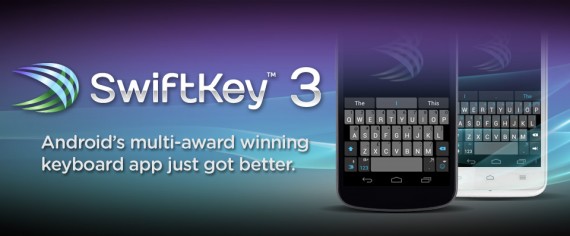Swype recently announced the newest version of its smart keyboard, and now competitor SwiftKey is launching its new Swiftkey 3 version. This artificially intelligent keyboard predicts what you are going to type based on what you start to type and what it already knows about your writing. Alternative products include Slideit, Thumb Keyboard and Smart Keyboard, but the market seems to be turning into a face-off fight between Swype and Swiftkey.
Swiftkey has also released a custom version for the medical industry called SwiftKey Healthcare, allowing health care professionals take better and faster notes on tablets. This is their first entry into enterprise and has attracted four US medical clients so far.
Swiftkey 3 is now on Google Play with a temporary half-price offer. There is a bigger space bar, a dedicated comma key, new themes, smarter punctuation and special character prediction. There is also better support for Android backup which means it won’t lose your database of learned phrases.
It also has two new themes – ‘Cobalt’, to match SwiftKey’s new look and feel, and an Ice Cream Sandwich-styled ‘Holo’ theme. There are now an additional seven languages (Korean, Estonian, Farsi, Icelandic, Latvian, Lithuanian and Serbian), bringing the total up to 42.
Swiftkey works by understanding what you intend to type by the context of what you are writing. It both corrects words and suggests the next word. The app can be synced with your email, Tweets, and Facebook status updates to better learn your style and vocabulary. As a result the company estimates it’s saved its users over 65 billion keystrokes.
Yesterday Swype’s owner Nuance updated the software with the firm’s Dragon speech recognition functions, letting users dictate text rather than type it. The ability to dictate, rather than type, words may help it in Asia where some languages with non-Roman alphabets have thousands of characters. Nuance bought Swype in October for $102.5m.
Swiftkey’s Ruth Barnett told me “While voice can be handy for dictating letters, it is a different proposition if you’re in front of a patient. It’s easier to tap away and have your next words accurately predicted than to repeat everything a patient tells you into a voice app while they’re sitting there twiddling their thumbs.”
